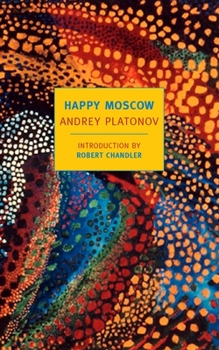Happy Moscow
Chestnova is a woman fascinated by the brave new world supposedly taking shape around her. In a variety of styles, this novel exposes the gulf between the premature triumphalism and the substandard... This description may be from another edition of this product.
Format:Paperback
Language:English
ISBN:1590175859
ISBN13:9781590175859
Release Date:November 2012
Publisher:New York Review of Books
Length:280 Pages
Weight:0.85 lbs.
Dimensions:0.5" x 5.1" x 8.0"
Customer Reviews
1 rating
Wonderful, but Can be Difficult
Published by Thriftbooks.com User , 22 years ago
Happy Moscow is a wonderful, though difficult, book. A cross between satire and the picaresque, it's loaded with symbolism. To get the most out of it, I think one must have at least a rudimentary knowledge of Stalinist Russia.Happy Moscow, through its heroine, Moscow Chestnova, sets aside blithe idealism and explores the gulf that, in reality, existed between Stalin's "triumphant" socialism and the low living standards and bleak expectations of the people.Moscow Chestnova, the heroine of Happy Moscow, was never meant to be seen as an individual. She's Every Citizen, the idea and the ideal of Stalinist Collectivity. More than anything, Moscow Chestnova cares; she embraces fully Dostoyevsky's mandate that "All are responsible for all." She cares about cleanliness, the proper heating of water, the driving of piles into the Moscow River. Following Stalinist ideology, she's the ideal every man desires and she gives of herself freely to anyone who asks. In Moscow Chestnova's world, as in Stalin's Moscow, there will always be room for "one more."Just as Moscow Chestnova seeks to transcend the limits of individuality in favor of collectivity, so do the other characters in this book. One, in particular, buys a new passport and thus changes his identity. He goes on to acquire a new job, a new wife and a new family...all in the name of communist idealism.Moscow Chestnova, of course, is eventually repelled by what she had, at first, embraced. She feels the isolation of the people, the lack of peace in their homes and in their lives and the oppressive sadness that covers the city like a blanket. Moscow finally comes to realize that even as individuals have been ignored, collectivity has gone to hell.The language used in Happy Moscow ranges from the hilarious to the grotesque. Stylistically, the book is often absurd in its juxtapositions. Puns are rarely used for comic effect alone; they often contain important ideological or philosophical commentary. Platonov also has a unique ability of recontextualizing Stalin's rhetoric (drawn from his own speeches) in ludicrous parody and metaphor.Happy Moscow is a gem of a book. It is a book, that, like the city of Moscow, herself, is, by turns, comic, creative, grotesque, and bizarre, yet ultimately crippled. It's a shame this book is not more widely read and better known.






